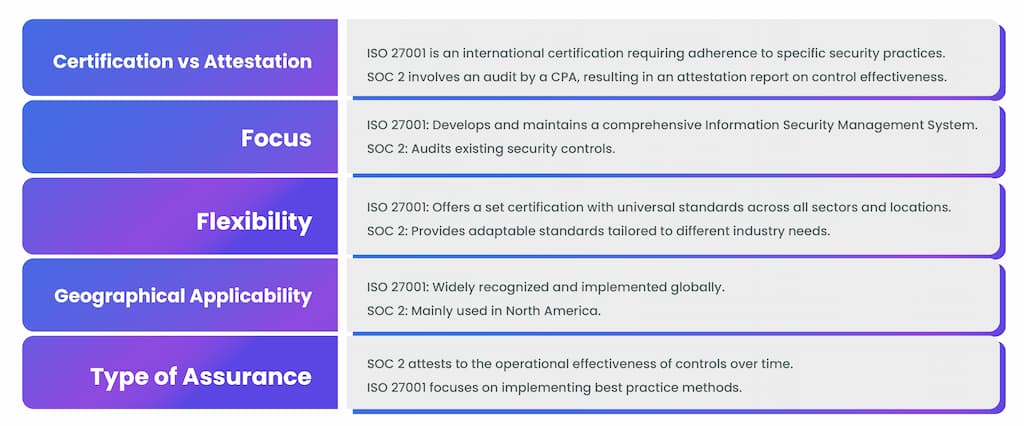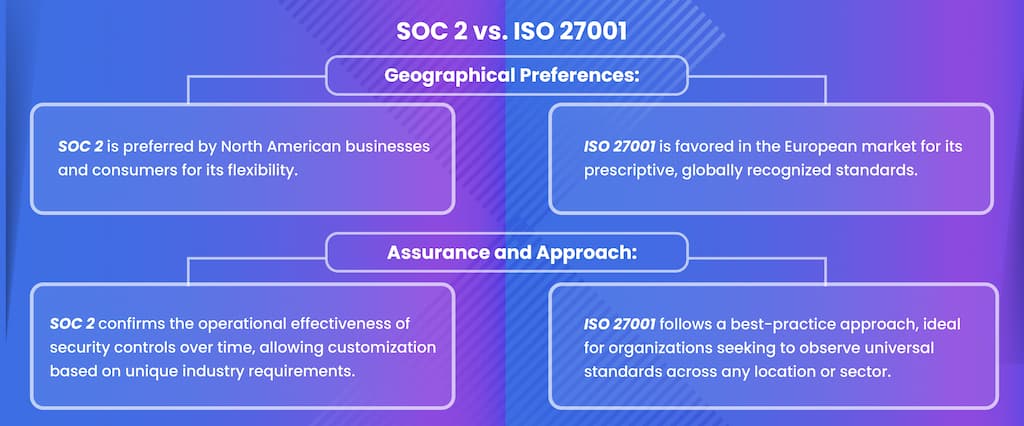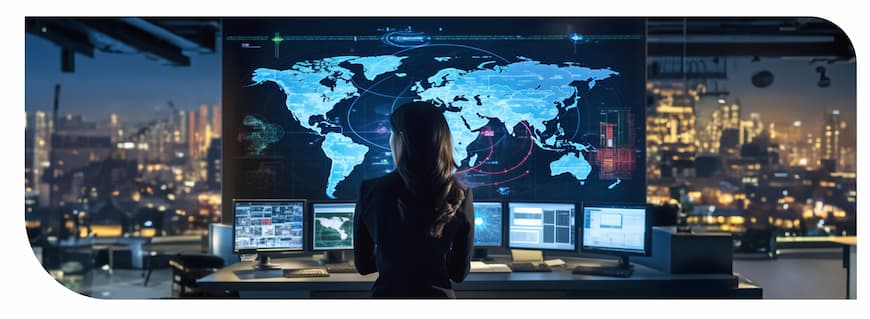As a business owner, you've likely heard about cybersecurity certifications, such as SOC 2 and ISO 27001. Learning what they are and why they could be essential for your business.
These certifications help demonstrate your commitment to information security, raise your brand's credibility, and could even become a competitive advantage. To help you make sense of it all, we'll give you an overview of SOC 2 and ISO 27001 - what they are, why they matter, and how they differ.
- Understanding SOC 2: The ins and outs
- Unveiling ISO 27001: What you need to know
- Why these certifications matter for your business
Definitions
This certification indicates an organization's diligence in building a robust information management and control system, dedicated to protecting client data.
Achieving this accreditation demonstrates that the company adheres to best practices in data protection and security, reinforcing their commitment to ensuring the confidentiality, integrity, and availability of crucial data.
Key Differences Between SOC 2 and ISO 27001

When working to bolster your company's information security, understanding the differences between SOC 2 and ISO 27001 can be game-changing. Here is a simplified list of the key differences to help you distinguish between the two:
- Certification vs Attestation: ISO 27001 is an international certification standard that requires conformity to specified security management practices. On the other hand, SOC 2 involves an independent audit by a Certified Public Accountant (CPA) or accountancy organization, culminating in an attestation report on the effectiveness of your organization's controls.
- Focus: While ISO 27001 prioritizes building and maintaining an inclusive Information Security Management System, SOC 2 zeroes in on auditing the current security controls in place.
- Flexibility: ISO 27001 is a somewhat fixed certification with global standards applicable to all sectors and geographic locations. Alternatively, SOC 2 exhibits greater flexibility with a system that is adaptable to varying industry standards and needs.
- Geographical Applicability: ISO 27001 enjoys a global reach, with businesses across different continents implementing its standards. However, SOC 2 is primarily utilized in North America.
- Type of Assurance: The SOC 2 certification provides heightened assurance by attesting to the operational effectiveness of controls over a duration of time. ISO 27001, however, is more rooted in implementing best practice methods.
Making the Right Choice: Deciding Between SOC 2 and ISO 27001

The choice between SOC 2 and ISO 27001 certification often lays in considering your organization's market stance, customer preferences, and regulatory requirements. Looking at geographical preferences, North American businesses and consumers have a tendency to lean towards the flexible standard of SOC 2. On the other hand, the prescriptive, globally recognized ISO 27001 certification is especially favored in the European market.
While SOC 2 provides a broad level of assurance by confirming the operational effectiveness of your security controls over a period of time, ISO 27001 follows a best-practice approach. This makes the latter ideal for organizations wanting to observe universal industry standards, regardless of their geographical location or industry sector. In contrast, SOC 2's approach of generally accepted practices allows customization based on your organization's unique industry requirements.
However, it's not an 'either/or' situation. Both ISO 27001 and SOC 2 share around 80% of requirements in common, consequently making it easier for firms to achieve both certifications. Pairing both certifications enables your organization to gain a more comprehensive view of its security controls, ensuring the integrity and availability of its data.
To help you navigate the compliance roadmap while minimizing risk and maximizing business resilience, platforms such as Sprinto offer an automated, intuitive, and scalable approach to achieving both SOC 2 and ISO 27001 readiness. Leveraging their intelligent automation and continuous monitoring features, Sprinto provides an efficient strategy for businesses aiming for both certifications, making light work of overlapping requirements.
Your final decision between SOC 2 and ISO 27001, therefore, should take into account your target market preferences, regulatory compliance needs, and desired security posture enhancement. And remember, it's not a binary choice. You can successfully adopt both frameworks as your business grows, enhancing customer trust and bolstering your company's resilience in the face of security risks.
Perspective: How Customers View Businesses With SOC 2 and ISO 27001 Certification

In today's digitally-driven era, having a trusted security certification - such as SOC 2 or ISO 27001 - can significantly impact how customers perceive your business. During the vendor selection process, customers have been found to prioritize due diligence, often requiring that businesses possess either the ISO 27001 certification or a SOC 2 report. This serves as an assurance that the company they're dealing with, is serious about data management and security.
Geographic Location and Customer Preference
What might have gone unnoticed, is the role of geography in determining the certification that customers prefer. Customers based in Europe have shown a preference towards businesses holding ISO 27001 certification. This standard is well, recognized across Europe, thus making ISO 27001 the broadly accepted security standard in this region.
On the contrary, American customers lean towards SOC 2. This preference is likely due to SOC 2 being an American standard and widely recognized amongst American clients. There is also the aspect of familiarity, as SOC 2 is often mandated by enterprise companies within the US. This trend sometimes leaves clients surprised with this mandate over ISO 27001 because both certifications serve the same purpose.
Perceptions on Dual Compliance
There's a growing conversation around dual compliance. Companies striving for both SOC 2 and ISO 27001 certifications send a strong signal to customers about their commitment to enhancing cybersecurity. This dual compliance not only strengthens the organization's cybersecurity but also enhances customer trust significantly. Customers perceive such businesses as capable enough to protect their information, and take robust measures to mitigate risks.
Yet, making the choice between SOC 2 and ISO 27001 isn't just about customer preference. As a business, you also need to consider aspects like your market, the specific needs of your customers, and regulatory requirements. Nevertheless, it's important to note that both ISO 27001 and SOC 2 are invaluable resources, fundamental in improving your business's security posture.
Why ShareVault Chose ISO 27001 as the Better Choice
ShareVault's decision to opt for ISO 27001 over SOC 2 is primarily rooted in its aspiration to maintain robust data protection and security standards that are recognized worldwide. This globally accepted certification provides a broad and comprehensive framework that defines how an organization should manage and handle its information securely, which dovetailed with the multinational scope of ShareVault's operations.
ISO 27001 serves as a testament to the fact that ShareVault is committed to foreign and domestic stakeholders alike by adopting the highest standards of data security practices. This is particularly significant for ShareVault, given the dealings with international clients necessitate a universally respected and stringent benchmark. Thereby, its dedication to protecting their clients' information goes beyond the borders of a single country or region, adding weight to their global customer base's assurance.
Moreover, ISO 27001's rigorous policy enforcement, grueling certification procedures, and regular audits set a solid foundation for ShareVault's Information Security Management System (ISMS). Prioritizing ISO 27001 to fulfill and exceed global legal, regulatory, and contractual obligations exhibits their commitment to risk management and exemplifies their determination to work within the most stringent security frameworks.
In essence, ShareVault's preference for ISO 27001 is testament to its unwavering dedication to uphold rigorous international data protection standards, reflecting their commitment towards establishing and maintaining a global standard of trust and reliability amongst their clients.

